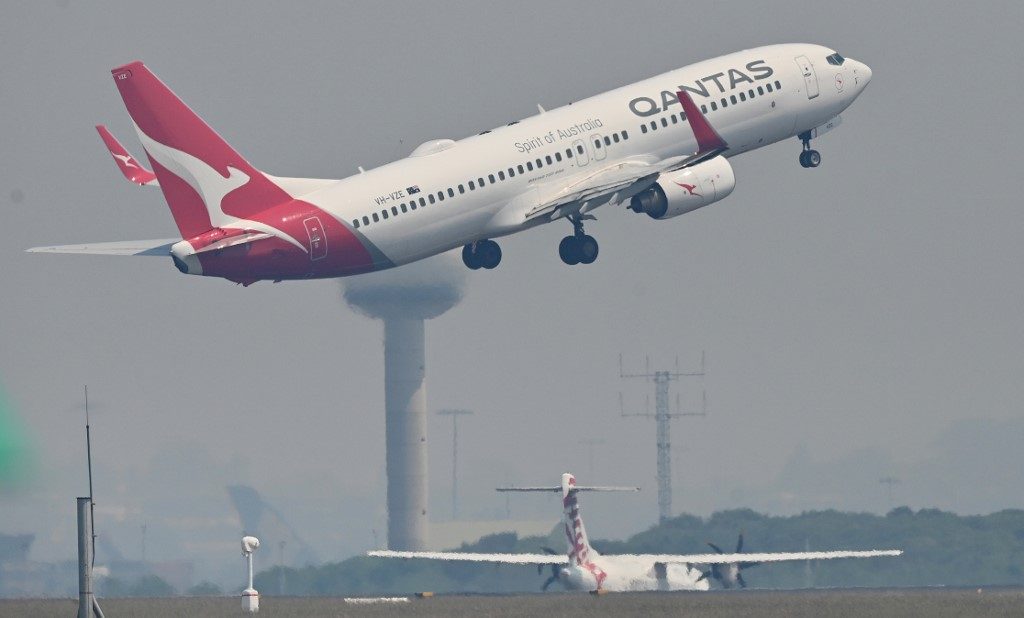SUMMARY
This is AI generated summarization, which may have errors. For context, always refer to the full article.

International travelers will need to be vaccinated against COVID-19 to fly with Australia’s Qantas, the company has said, the first major airline to suggest that such rules could become common across the industry.
Qantas chief executive officer Alan Joyce said late Monday, November 23, the Australian flag carrier would implement the measure once a coronavirus vaccine was made available to the public.
“We are looking at changing our terms and conditions to say for international travelers that we will ask people to have a vaccination before they can get on the aircraft,” he told Channel Nine television.
“Whether you need that domestically, we will have to see what happens with COVID-19 in the market but certainly, for international visitors coming out [to Australia] and people leaving the country, we think that is a necessity.”
Joyce predicted the rule would likely become standard practice around the world as governments and airlines currently consider the introduction of electronic vaccination passports.
Other major regional airlines, however, said that it was too early to comment on what travel requirements might be when a vaccine becomes widely available.
“We don’t have any concrete plans to announce at this point on the vaccine as it is still in development and will take time to distribute,” a Korean Air representative told Agence France-Presse.
Japan Airlines similarly said it had “no plans to require international travelers to have a vaccination” and is for now asking “passengers to follow rules of their destinations, such as taking tests.”
Vaccination entry requirements are already widely used around the world, with many countries demanding travelers show they have been inoculated against yellow fever if they are coming from regions where the disease is endemic.
The International Air Transport Association (IATA) announced late Monday it was in the “final stages” of developing a digital health pass that it says can be used to record COVID-19 tests or vaccinations and will “support the safe reopening of borders.”
“We are bringing this to market in the coming months to also meet the needs of the various travel bubbles and public health corridors that are starting operation,” IATA director general and CEO Alexandre de Juniac said.
Up in the air
Australia’s borders have effectively been closed since March to curb the spread of the novel coronavirus, which has already claimed more than a million lives worldwide.
The country has even limited the numbers of its own citizens allowed to return each week, leaving tens of thousands of Australians stranded overseas.
The global airline industry has come under huge pressure from restrictions aimed at slowing the spread of the virus.
Qantas has grounded more than 200 planes and fired 8,500 staff as it attempts to offset a US$1.9-billion loss caused by the collapse in demand for air travel.
A slew of other carriers have collapsed because of the pandemic, including Virgin Australia, Chilean-Brazilian airline LATAM, and Britain’s Flybe.
IATA said in October that after a predicted 66% drop in global air traffic this year, airlines’ revenues are expected to be down by 46% in 2021 compared to 2019.
Prime Minister Scott Morrison has said Australia is seeking to create “travel bubbles” with other countries that have curbed the spread of the virus.
But the country is unlikely to fully reopen to international travelers until a vaccine is widely available.
The government also signaled in its recently released COVID-19 vaccination policy that Australia and other nations may introduce proof of inoculation as a condition of entry.
Australia has been relatively successful in containing the coronavirus, recording just over 27,800 cases and 907 deaths since the pandemic began. – Rappler.com
Add a comment
How does this make you feel?


![[Time Trowel] Evolution and the sneakiness of COVID](https://www.rappler.com/tachyon/2024/02/tl-evolution-covid.jpg?resize=257%2C257&crop=455px%2C0px%2C1080px%2C1080px)


There are no comments yet. Add your comment to start the conversation.